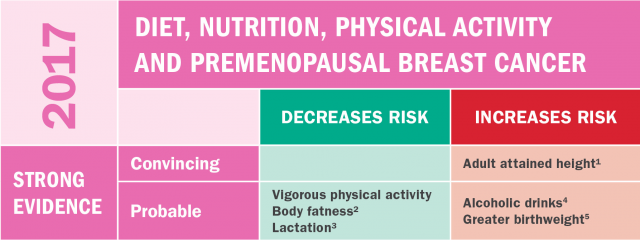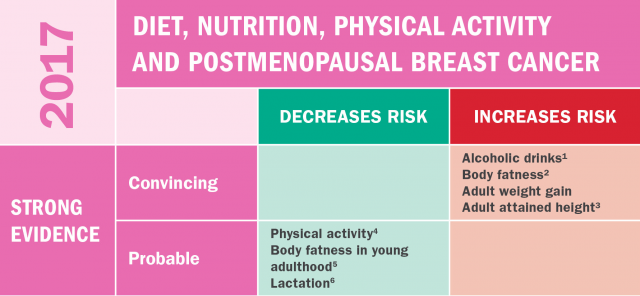As diagnosis and treatments for breast cancer improve, more and more women are surviving their diagnosis—and surviving longer.
The findings of AICR’s latest report on breast cancer continue to support our recommendation: eating a plant-based diet, maintaining a healthy weight, and getting regular physical activity remain the best strategies for reducing breast cancer risk.
Lifestyle and Breast Cancer Risk
- Alcohol
Drinking alcohol — in any form — raises breast cancer risk.
- Alcohol influences blood levels of estrogen and other hormones in ways that may make cancer more likely.
- Alcohol is a recognized carcinogen. It can cause cellular damage that can trigger cancer development.
- Weight
Carrying excess body fat increases risk for post-menopausal breast cancer.
- Fat tissue causes inflammation, which can promote cancerous changes in healthy cells.
- Being overweight and obese increases blood levels of insulin and related hormones that can encourage the growth of cancer.
- Physical Activity
Being active decreases risk for breast cancer.
- Vigorous activity decreases risk for pre-menopausal breast cancer.
- Regular physical activity helps regulate hormone levels.
- Breastfeeding
If you’re able, breastfeeding your baby lowers your risk of breast cancer.
- Lactation could decrease lifetime exposure to menstrual cycles and therefore alters hormone levels, particularly androgens, which can influence cancer risk.
- The shedding of tissue during lactation and the elimination of breast cells at the end of lactation both provide protection.
- Healthy Diet
A plant-based diet with a variety of fruits, vegetables, beans and whole grains can help you maintain a healthy weight and therefore lower your risk.
- Family History
Inheriting BRCA-1 or other “cancer genes” does increase risk, but these inherited genetic factors are responsible for only about 5 to 10 percent of all breast cancers.

Foods that fight breast cancer.
No single food can protect you against cancer by itself. But research shows that a diet filled with a variety of vegetables, fruits, whole grains, beans and other plant foods helps lower risk for many cancers.
Cancer Updates
The science of survival.
AICR’s health guides and recommendations are developed from research that focuses on how nutrition and lifestyle affect the prevention, treatment, and survival of cancer. Paramount to our updates is the Continuous Update Project which helps you stay on top of new findings, and understand the data that sits at the center of our work.







